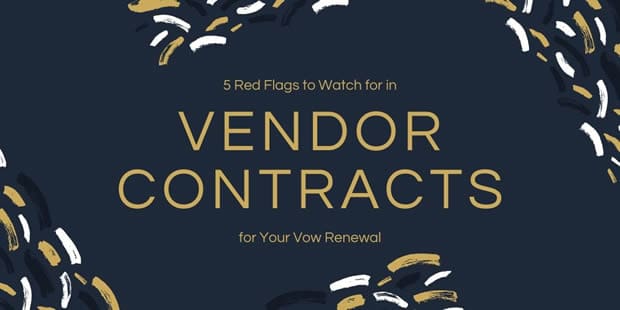7 Red Flags to Watch for in Vendor Contracts for Your Vow Renewal
7 Red Flags to Watch for in Vendor Contracts for Your Vow Renewal
Discover 7 red flags to watch for in vendor contracts for your vow renewal. Avoid common contract mistakes and protect yourself from costly issues!

Planning a vow renewal can be an exciting yet complex process, especially when it comes to dealing with vendor contracts. While it’s easy to get swept up in the excitement, signing contracts without thoroughly reviewing them can lead to unexpected surprises. From incorrect details to hidden fees, there are several red flags to watch for in vendor contracts to ensure your vow renewal goes off without a hitch. In this guide, we’ll cover the top 7 contract red flags you should keep an eye on and how to address them before signing on the dotted line.
1. Incomplete or Incorrect Details of Your Order
One of the most common contract issues is missing or incorrect details. It’s your responsibility to ensure that every detail in the contract matches your expectations. This includes:
- Itemized lists: Ensure that every element of your order—whether it’s a cake, flowers, or décor—is clearly spelled out with specifics, including quantities, colors, sizes, styles, and any other important details.
- Double-check your changes: If you’ve discussed any modifications with your vendor, such as switching the cake flavor or adding more floral arrangements, make sure the contract reflects those changes. Vendors often won’t revisit the contract until shortly before your event, and they may not recall conversations about changes if they weren’t updated in writing.
By catching these details before signing, you avoid receiving the wrong items or services on your big day.
2. Incorrect Date or Time
Believe it or not, one of the most easily overlooked errors in vendor contracts is the date or time of your event. An incorrect date or time can cause major headaches, especially if your vendor is unavailable on the correct day:
- Triple-check the date and time: Make sure the correct day, month, and year are listed, as well as the proper start time for the service.
- Verify availability: If you notice a mistake after signing, it may be too late to fix it if your vendor is already booked with another client.
Confirm the details multiple times to ensure that the vendor is scheduled when and where you need them.
3. High Minimum Guest Count Requirements
Some vendor contracts include a minimum guest count requirement for the pricing offered, and this can be a costly trap:
- Check the percentage: Ideally, the minimum guest count should be no more than 40-60% of your invited guests. For example, if you’ve invited 100 people, the minimum should not exceed 60 guests.
- Consider your attendance: If fewer guests show up than expected, you could end up paying for unused meals or services. Some vendors will also raise the per-guest price if attendance drops below the minimum.
Always ensure the minimum guest count requirement is realistic based on your expected attendance to avoid paying for empty seats.
4. Extreme Cancellation Policies
Every vendor contract will include a cancellation policy, but some may include terms that are too strict or financially punishing:
- Look for non-refundable deposits: It’s standard practice for deposits to be non-refundable, but be wary of contracts that require full payment if you cancel more than 60-90 days before the event.
- Reasonable cancellation window: A cancellation window of 60 days or less is more reasonable, as it gives the vendor time to rebook another client. Be cautious of vendors who require full payment even if you cancel several months in advance.
If a cancellation policy feels extreme, try negotiating more favorable terms before agreeing to the contract.
5. Prohibition on Posting Reviews
A major red flag is a clause that prohibits you from posting reviews online after the event. Reputable vendors should welcome feedback from their clients, but some include restrictive clauses to protect their reputation:
- Check for non-disparagement clauses: If the contract prohibits you from posting reviews or penalizes you for leaving negative feedback, this could be a sign the vendor has something to hide.
- Your right to review: As a client, you should have the freedom to share your honest opinion about the vendor’s services on platforms like Yelp, Google, and other review sites.
Avoid vendors who attempt to limit your ability to post reviews, as this may be a sign of poor service or past issues with other clients.
6. Hidden Fees and Costs
Vendor contracts sometimes include hidden fees or costs that can significantly increase your overall expenses. These fees may not be obvious at first glance but can add up quickly:
- Extra service charges: Be sure to look for any additional fees for setup, teardown, overtime, or specific services that may not have been included in the original quote.
- Gratuities and taxes: Some vendors automatically add service charges or gratuities to your final bill. Be sure to clarify whether these fees are included or separate from the quoted price.
Always request a detailed breakdown of the costs to avoid any surprises when it’s time to make the final payment.
7. Unclear Payment Terms
Finally, be sure to pay attention to the payment terms laid out in the contract:
- Due dates: Make sure you understand when payments are due, including the deposit and final balance. Some vendors may require full payment well before your event, while others allow more flexibility.
- Payment methods: Clarify acceptable forms of payment, such as credit cards, checks, or online payments, and ensure that the process is clearly spelled out.
- Late fees: Be aware of any late payment penalties, which can sometimes be substantial.
By ensuring that the payment terms are clear and manageable, you’ll avoid unnecessary financial stress in the lead-up to your vow renewal.
Final Thoughts
Carefully reviewing vendor contracts is essential to ensure that your vow renewal goes off without a hitch. By keeping an eye out for these 7 red flags—from incorrect details and extreme cancellation policies to hidden fees and unfair review restrictions—you can avoid potential pitfalls and protect yourself from costly mistakes. When in doubt, it’s always a good idea to consult with a professional planner or legal expert to review contracts before signing.
Planning your vow renewal? Don’t sign those contracts just yet! Check out our complete vow renewal planning guide for more expert tips on planning a stress-free and unforgettable celebration.


